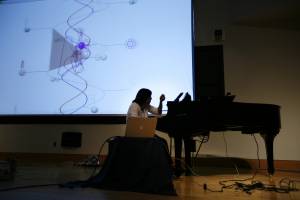Elaine Chew | COSMOS | Research Blog | Research Bio | Music Blog| Music Bio | Soundcloud | Youtube | CV
Elaine Chew: Music Bio
Elaine Chew is a versatile and interdisciplinary artist transgressing boundaries to make fresh connections between disparate ideas. A virtuoso pianist, she has created and performed as soloist and chamber musician in concerts that combine the arts and sciences, the musical and visual arts, classical music and cutting-edge technology. She has been interviewed on Los Angeles Philharmonic's Inside the Music, BBC Radio 3 and BBC World Service, podcasts of Ada Lovelace Day and the Barbican, and in documentaries, The Man Who Saved Geometry and Bridging Urban America, for which she also recorded soundtracks. Her live performance of Poulenc's Sextuor with Lehigh University's East Winds Quintet and Ivan Tcherepnin's Fêtes–Variations on Happy Birthday has been broadcast on WDIY and WGBH's Art of the States.
A collaboration amongst Chew, Child, and conceptual artist Lina Viste Grønli resulted in Practicing Haydn (2013), a transcription of Chew's sight reading of a Haydn Sonata movement into a performable piece, which premiered at the grand opening of the Kunsthall Stavanger. Other experimental compositions include computer-generated pieces produced by the MorpheuS system designed with Dorien Herremans, and the Little Etudes (2020) and Arrhythmia Suite (2017-2018) for piano based on electrocardiographic traces of cardiac arrhythmias.
While Affiliated Artist of the MIT Music and Theater Arts Section, she founded the Aurelius Ensemble and was the driving artistic force behind its contemporary music concerts (1998-2000), which achieved standing room only audience attendance. More recently, as Professor of Digital Media and Director of Music Initiatives of the Centre for Digital Music (C4DM) at Queen Mary University of London, she was founding artistic director of the C4DM concert series (2015-2016).
Born in Buffalo, New York, Elaine Chew studied piano in Singapore with Ong Lip Tat—student of Lucien Wang (student of Alfred Cortot), Alexander Kelly (RAM), Carlo Vidusso and Nikita Magaloff (Milan), Robert Henry and Hans Leygraf (Hamburg)—Goh Lee Choo, and Martina Maixnerova, at Stanford with James Goldsworthy and George Barth, and at MIT with David Deveau. She also studied chamber music at Stanford with Philip Levy, at MIT with Marcus Thompson, John Harbison, Lynn Chang, and Jean Rife, and accompanied the vocal repertoire classes of Judith Bettina (Stanford) and John Oliver (MIT). She holds LTCL and FTCL diplomas in piano performance from Trinity College, London, a BAS in Music Performance (distinction) and Mathematical and Computational Sciences (honors) from Stanford, and MSc and PhD in Operations Research from MIT, where she won the Laya and Jerome B. Wiesner Award for outstanding achievement and contribution to the arts. Her doctoral dissertation was supervised by Jeanne Bamberger (student of Artur Schnabel, Roger Sessions, and Olivier Messiaen).
Chew is also an award-winning mathematical and computational scientist, specialising in the design of robust and efficient computer algorithms to decode and analyse musical structures. She is on the distinguished Editorial Advisory Board of the Computer Music Journal (since 2016) and served on the Scientific Council of Ircam (2019), Visiting / External Review Committees of MIT Music and Theater Arts (2004-2012) and the Georgia Tech School of Music (2017), and as adjudicator for the 2017 Guthman Musical Instrument Competition. She is frequently invited as keynote speaker at international conferences and is an active spokesperson for the deep connections between music and mathematics, music and technology, and women in technology (see her science bio).


